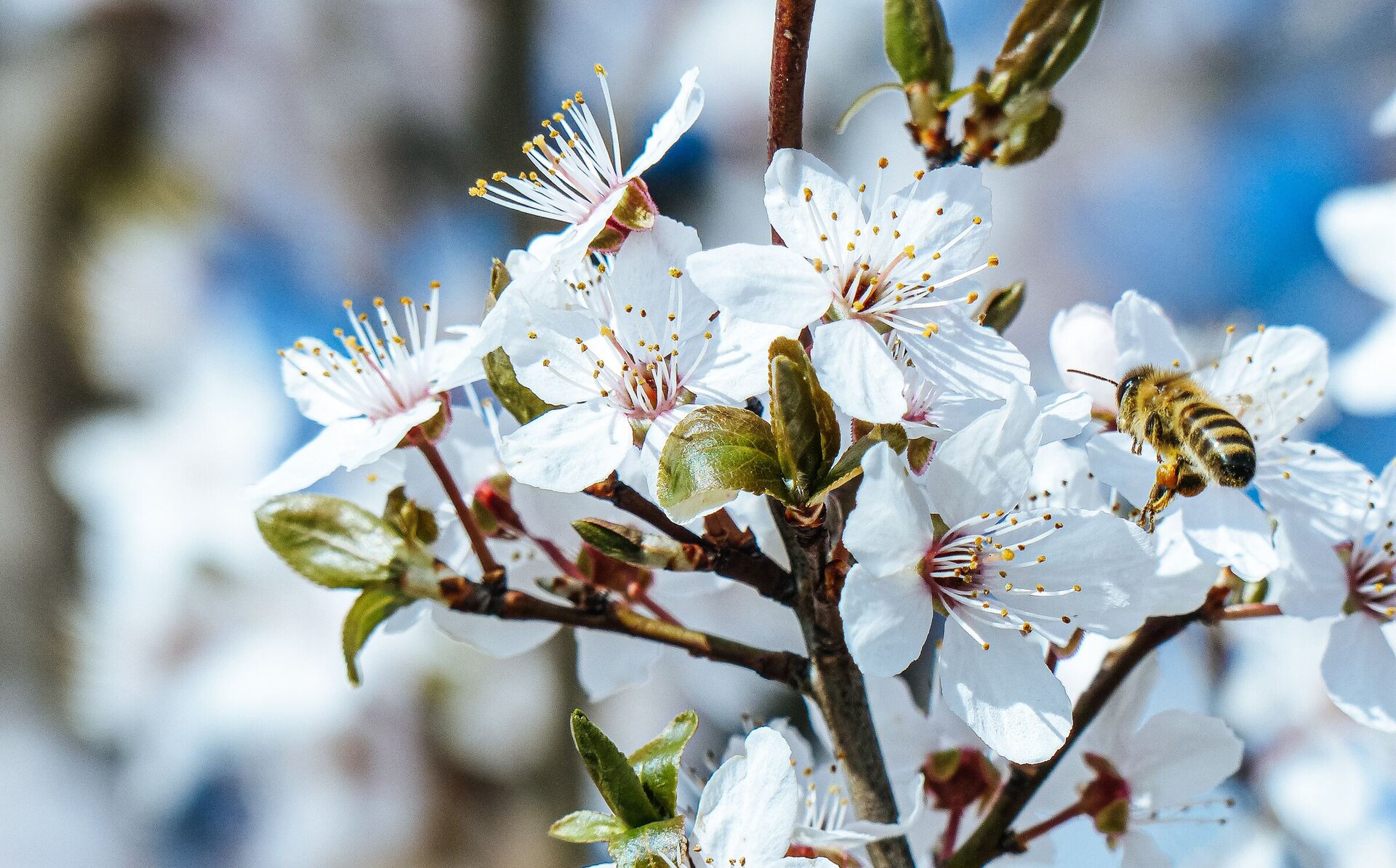Bee Pollen Research
Chemical analysis from research laboratories all over the world show that bee pollen is a complete food. Bee pollen contains the following nutrients (the location and source of bee pollen can cause variability in the vitamin and mineral content of bee pollen): All essential amino acidsAll minerals, including phosphorus, potassium, magnesium, calcium, copper, manganese, iron and zincSome trace mineralsB vitaminsVitamin CVitamin EFolic AcidPanthothenic AcidRutinLecithinRNADNAEnzymesAnti-oxidants, ...
November 10, 2020What's Special About Sweetree Bee Pollen?
Sweetree Bee Pollen is collected from our home apiary site at rural Horsham Downs, near Hamilton. With abundant nearby flora, Sweetree honey bees gather pollen from a wide range of flowering plants, reflected in the many different colours of pollen. These colours indicate a highly nutritious bee pollen and we have received many favourable comments from our customers regarding its effectiveness. We ensure that our bee pollen is kept as fresh as possible, storing no longer than t...
November 6, 2020What's the Buzz About Bee Pollen?
Bee pollen is an incredible natural source of nutrients, vitamins and minerals. Studies have shown that it has a nutritional composition that surpasses that of virtually any food eaten. Regular consumption of bee pollen aids your general health and well-being. Just some of the benefits reported of our Sweetree Bee Pollen are: Sustained energy, enhanced immunity, reduced stress, relief of inflammation, more rested sleep and better skin condition. Studies have also shown that taking bee pollen imp...
October 27, 2020Do You Sweeten Your Tea With Honey?
Many people love to sweeten their tea with honey. The main reasons are because it tastes delicious and it's so much better for you than sugar! Honey sweetens without adding any unhealthy ingredients to your drink, it adds goodness instead. Raw honey in your tea can soothe, heal sore throat and coughs and revitalise you at the same time.An added benefit is that honey tastes sweeter than sugar, so a little goes a long way. One teaspoon of honey per cup of tea is a good rule ...
October 16, 2020Breaking News.... We are Finalists in the NZ Artisan Awards!
We've just heard the exciting news that we are finalists in the NZ Artisan Awards! With well over 600 brands entered, the competition was tough. So much so, that a new category was opened up to cater for the huge number of honey brands that entered. The Inspire+ Artisan Awards have showcased the depth and breadth of New Zealand’s best and locally made produce something that resonates with New Zealand consumers in the new normal where we are all strongly identifying with buying local...
September 2, 2020Bee Aware Month
September is Bee Aware Month, a great opportunity to think about our wonderful bees as we start getting back into the garden this spring. Just take these simple steps:...
August 29, 2020Honey: Effective Treatment for Coughs and Colds
For centuries honey has been used as a home remedy to treat coughs and colds, now the research backs this up! Research suggests that honey is more effective than many over-the-counter medicines, studies indicate that: Honey may be better than conventional treatments for coughs, blocked noses and sore throats. It is good value for money, readily available, and has virtually no side-effects.Honey was more effective than usual care for improving symptoms, especially the frequency a...
August 20, 2020Epsom Salts
Magnesium is responsible for over 300 enzymatic reactions in the body, and its effects are wide-reaching. Just some of the things it does include: blood glucose control, protein synthesis, muscle contraction, nerve function, detoxification, energy production, and more! A great way to get magnesium into your body is by soaking in epsom salts. We have been using Sam Walker Epsom Salts for years and swear by them. We love that it's natural, chemically pure, food-grade ma...
August 17, 2020Embrace Nature this Conservation Week
See nature through new eyes this Conservation Week, 15-23 August 2020. Conservation week is a great opportunity to immerse ourselves in nature and embrace what's always been there; look, listen, breathe and feel.Since the COVID-19 lockdown, many of us slowed down and looked at our lives and the world differently. So, the Department of Conservation is inviting us to enjoy a fresh perspective on our natural spaces and unique wildlife and boost your wellbeing by immersing ourselves in nature. ...
August 14, 2020How to Prevent Seasonal Allergies
Spring is just around the corner! Yeah - more daylight hours, flowers blooming and birds singing. More time to spend in the garden and playing outside with the kids. But for hay fever sufferers spring can be a dreaded time! Sneezing, watery eyes, itchy throat, coughing, itchy nose, blocked/runny nose. During this time many people stock up on tissues and run to the chemist to grab antihistamine, sometimes even antihistamine isn't enough. It's no fun at all! In ...
August 8, 2020Beehive Boxes Repurposed into Beautiful Art!
Nothing goes to waste here! Even our old beehive boxes get a new lease of life by local artist Claudia Aalderink. Claudia takes rustic, weathered, and colourful beehive boxes, along with found materials such as wine barrel rings, pallet straps, and anything usable and transforms them into unique and one of a kind pieces of art. I've never met anyone who can take a basic discarded item and create such beauty like this before.We love that the materials that could have e...
August 7, 2020How is Sweetree Honey Processed?
Sweetree raw honey is extracted by cutting the wax cappings off each wooden honey frame, they are then placed into a spinner, where the centrifugal force extracts the honey from the frames. We then cream our honey, this is to ensure that your honey does not granulate (look sugary) and it maintains a consistent texture. During this process the only thing that is added is a fine-grained natural honey, this is used like a starter to start the creaming process. The honey is then st...
July 27, 2020Bee Pollen Facts
Bee pollen is collected by honey bees. As the bee moves from one flower to another it places flakes of pollen into pollen baskets on its back legs. It combines the flakes with nectar to make a granule of bee pollen.Bee pollen is an incredible natural source of nutrients, vitamins and minerals. Studies have shown that it has a nutritional composition that surpasses that of virtually any food eaten. Regular consumption of bee pollen aids your general health and well-being. Just some of the benefit...
July 15, 2020What Do The Manuka Honey Ratings Mean?
Manuka rating labels can be so confusing! But to ensure you purchase real manuka honey you do need to understand them. Look for the following ratings, just having 'active' or 'bioactive' on a label is not a true indication it is pure manuka honey.Non-Peroxide Activity (NPA) Only manuka honey has NPA. This non-peroxide activity is rated to signify the level of antibacterial strength. The higher the rating the higher the activity and therefore the greater the healing power (just like SPF in sunscr...
June 28, 2020What's the Difference Between Mono-Floral and Multi-Floral Manuka?
Manuka labels can be so confusing! But I'm going to try and demystify that for you. Let's start with mono-floral and multi-floral manuka. Mono-Floral Manuka Mono-floral honey comes from a single flower source. Mono-floral manuka honey means that the bees predominately foraged on manuka flowers, therefore it's a more pure manuka honey. Multi-Floral Manuka Muti-flora honey is from a mix of flower sources. For a manuka honey to be labeled as 'multi-floral manuka it means that ther...
June 25, 2020What's So Special About Manuka Honey??
Honey is one of the oldest known sweeteners. It has been an essential part of our diet since the earliest times and there is increased interest in its culinary and health properties. Not only is it delicious to eat, but honey is also hailed for its medicinal properties – it is anti-bacterial, anti-viral, anti-fungal, and packed with highly valuable nutrients. All honey has some naturally occurring antibacterial qualities (peroxide activity). This is due to the high levels of ...
June 22, 2020Antibacterial Honey
All honey has some naturally occurring antibacterial qualities (peroxide activity). This is due to the high levels of sugar in the honey, therefore fewer water molecules, which makes it hard for bacteria to grow. Hydrogen Peroxide can easily be damaged by light and heat. This is one of the reasons why at Sweetree Honey we are very careful not to damage our honey with heat, so all our honeys retain some antibacterial properties. Find out how honey is tested for heat damage....
June 17, 2020Great News - We Won Silver!
We've had a little bit of good news at this unsettling time. We entered our Sweetree Four Brothers Reserve honey in the Outstanding NZ Food Producer Awards and won a SILVER medal! These awards celebrate Kiwis who harvest, grow and make food and drinks. All products were judged on quality, taste, consistency, visual appearance, packaging, innovation, point of difference, sustainable practices and story behind the product. We were up against a lot of other products...
May 29, 2020Sweetree Honey Facts
Honey is one of the oldest known sweeteners. It has been an essential part of our diet since earliest times and there is increased interest in its culinary and health properties. Not only is it delicious to eat, honey is hailed for its medicinal properties – it is anti-bacterial, anti-viral, anti-fungal and packed with highly valuable nutrients....
May 19, 2020What is HMF?
Hydroxymethylfurfural (HMF) is a break-down product of fructose (one of the main sugars in honey), it forms slowly during storage and very quickly when honey is heated. According to Hills Laboratories HMF is created by the thermal decomposition of sugars and can provide evidence that honey has been heated or 'cooked'.Fresh natural honey can have varying levels of HMF. In the hive honey would normally be below 1 mg/kg but levels soon start to rise with ambient temperatures above 20°C...
April 14, 2020Bee Pollen and Sports Nutrition
Bee pollen proves to be quite useful for activity enhancement and sports nutrition. It produces an accelerated rate of recovery, including a return to normal heart rate, breathing, and readiness for the next event. Bee pollen improves second and subsequent performances. Humans not receiving bee pollen show declining performances. It provides energy, stamina, and strength, and enhances performance levels. With its natural antibiotic effect it also helps prevent the onset of colds, particularly wh...
March 17, 2020Helping NZ Bees
Bees are critically important to New Zealand and to the New Zealand economy – much more so than you beemight think! Without bees, our gardens would be without many of their plants and flowers, and our major agri-export industries (worth around $5 billion) would be in severe trouble! At least one third of our food depend on honey bees for pollination, this food provides us 35% of our calories, most of our minerals, vitamins, and anti-oxidants. What would happen to our nutrient food intake ...
March 11, 2020Wash Your Face with Honey!
Are you like me and have a daily routine of cleansing, toning and moisturising your face? Or is it your new years resolution to start taking care of your skin? Either way why not give honey a go! You can save a lot of money and look after your skin at the same time by cleansing your face with honey. Pop about a teaspoon or so of Sweetree Honey into the palm of your hand, add a touch of water and massage it over your face, then let it sit for a while. Of c...
January 18, 2020Peach & Honey Cake
This is a delicious pear and honey cake that I'm sure everyone will enjoy. Designed by a local chef using local honey!...
January 14, 2020Vicki's Ultimate Health Bar
This is a yummy and healthy snack for the family, great in school lunches and tramping. It's full of natural goodness....
December 25, 2019 Posts 51-75 of 318 | Page prev next





